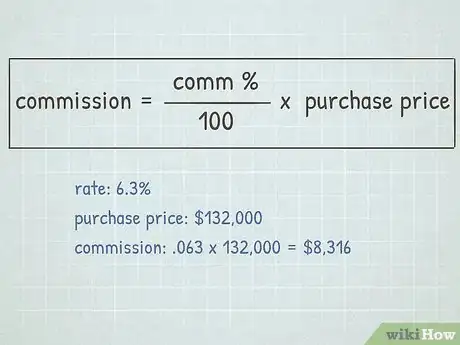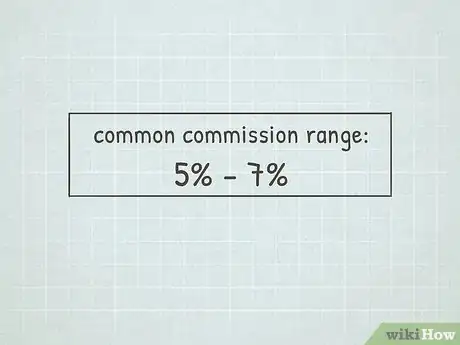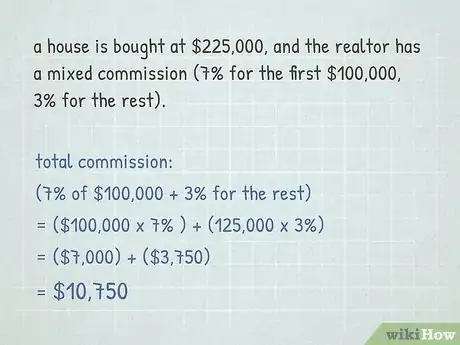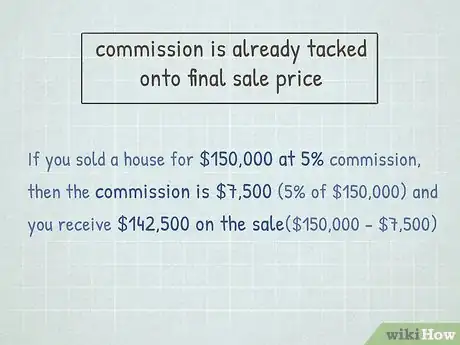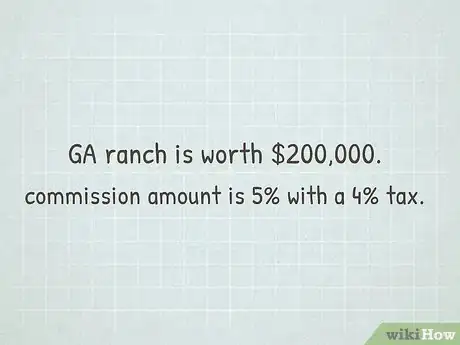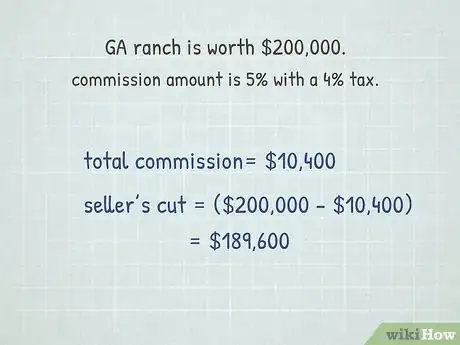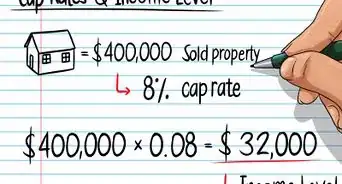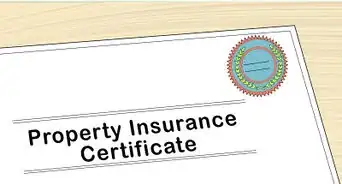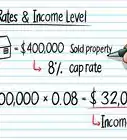This article was co-authored by Carla Toebe. Carla Toebe is a licensed Real Estate Broker in Richland, Washington. She has been an active real estate broker since 2005, and founded the real estate agency CT Realty LLC in 2013. She graduated from Washington State University with a BA in Business Administration and Management Information Systems.
wikiHow marks an article as reader-approved once it receives enough positive feedback. In this case, 81% of readers who voted found the article helpful, earning it our reader-approved status.
This article has been viewed 347,650 times.
If you buy or sell a real estate property, you may owe a commission to the brokers and agents involved in buying or selling the property. Commissions are often paid by the home seller, and the overall commission is split by the agent who worked on behalf of the seller and the agent who represented the buyer, or between the listing broker and the selling broker. Learning how commissions work and how they are calculated can help you to determine the cost of your property, or how much you will receive from a sale.
Steps
Calculating Common Real Estate Commissions
-
1Multiply the commission percentage by the purchase price to find out your total commission. To estimate commission, simply multiply the percentage by the purchase price of the property. Remember to convert percentage to decimal first by dividing it by 100.
- Rate: 5.5%; Purchase Price: $200,000 → .055 x 200,000 = $11,000
- Rate: 4.75%; Purchase Price: $325,000 → .0475 x 325,000 = $15,437.50
- Rate: 6.3%; Purchase Price $132,000 → .063 x 132,000 = $8,316
- Formula =
-
2Familiarize yourself with common commission amounts. When you buy or sell a home, the broker receives a percentage of the sale value as commission. This is their payment for helping you buy or sell the house. This percentage typically ranges between 5% and 7%, with the average currently around 5.5%.[1]Advertisement
-
3Discuss your specific commissions before signing any paperwork. Some brokers have arrangements where there will be a certain percentage charged on the first $100,000 of the home value, and a smaller percentage charged on the remainder of the house. On rare occasions, the commission is a flat fee.[2] If you buy a house for $225,000, and your Realtor has a mixed commission (7% for the first $100,000, 3% for the rest), you would simply break the price up and calculate separately:
- $225,000 - $100,000 = $125,000
- ($100,000 x 7%) + (125,000 x 3%)
- ($7,000) + ($3,750)
- Total Commission = $10,750
-
4Remember that commission is already tacked onto final sale price. A commission reduces the seller's net proceeds from the sale. The seller pays it in one sense because it reduces the net proceeds. For example, if you are selling a home for $200,000, and if the dollar value of the commission is $10,000, you will receive $190,000 for your purchase.
- If you sold a house for $150,000 at 5% commission, you receive $142,500 on the sale, or $150,000 - $7,500 in commission.
- If you buy a house for $225,000, and your Realtor's commission is 4.6%, then you'll be paying your Realtor $10,350.
- In a typical real estate contract in the United States, the buyers do not pay the real estate commissions. It is taken out of the seller's proceeds. The buyer pays the agreed upon purchase price plus their closing costs. If you are buying a house and the seller is not offering a real estate commission, then you may end up paying the real estate commission on top of the purchase price. It depends on what you negotiate with the Realtor.
-
5Understand how commissions are split between brokers. The standard arrangement is that the broker representing the buyer and the broker representing the seller will each split the commission 50/50. At this point the broker would then split the commission according to the brokerage/agent contracted agreement. Note that if you choose not to use a broker, the seller's broker would receive the entire commission. The commission fee between the seller and broker is always negotiable.
- If you had $10,000 commission, $5,000 would go to the buyer's broker, and $5,000 would go to the seller's broker.
Calculating Total Cost of a Sale
-
1Settle on the commission amount ahead of the sale. Before selling a property, make sure to determine exactly what the commission will be in percentage form. Commissions are often negotiable, and do not be afraid to ask for a reduction in commissions, especially if you are selling a high-value property.
- In some cases, the broker and agent will split the commission. In these cases, you may need to negotiate with both of them to determine what their total commission will be, and then they can work out an appropriate commission split and divide the commission between them.
- For this section, assume you settled on a 5% commission with your Realtor for a ranch house in Georgia.
-
2Determine the property's gross sale price. Once the commission is determined, you need to determine the sale price of your property. Ask your agent for help in understanding the sale price of your home. The commission will be based on the total price of the home, not the amount the seller gets to keep after a mortgage or other lien is paid off. The sale price will only be finalized once you have agreed to an offer from a buyer and the appropriate legal documents have been signed and confirmed.
- Continuing the example, pretend this GA ranch is worth $200,000.
- Note that gross sales price refers to the price of your home before any deductions are taken off. This means before any taxes, commissions, fees, etc.
-
3Calculate the commission by multiplying the gross sales price of the property by the commission percentage that was agreed upon. For example, our ranch that sold for $200,000 with a 5% commission rate would result in a $10,000 agent commission. Remember to convert the percentage to a decimal (by dividing by 100) before multiplying if your calculator does not have a "%" button.[3]
-
4Add taxes to the commission amount. Since commission is being paid in exchange for a service, the commission amount is often taxed just like any other purchase with a sales tax. Sales tax rates vary between states and countries. To calculate this, simply find out what the sales tax amount is (say, 4%), and multiply that amount by the commission amount. This will tell you the amount of tax that is owed, and you can simply add this amount to the total commission owing to obtain the total cost of the commission.
- For example, multiply 4% (or 0.04) by your $10,000 commission and you get $400 in sales tax. This means your total commission would be $10,400. Note that sales tax is not charged in all states on commissions.
-
5Subtract the commission from the total sale to determine your cut. To determine the net proceeds you will receive for your home after commission and other selling costs, subtract the commission and other selling costs from the amount of the purchase price.
- For example, if commission was the only selling cost, and the ranch's purchase price is $200,000, and your total commission was $10,400, then you would have net proceeds of $189,600.
- Keep in mind that there are other selling costs besides commission to factor in when you are determining what the net proceeds are. A real estate agent can help estimate these costs for you.
Expert Q&A
Did you know you can get expert answers for this article?
Unlock expert answers by supporting wikiHow
-
QuestionHow do commissions work if two people are trading/buying each others homes and both have agents?
 Carla ToebeCarla Toebe is a licensed Real Estate Broker in Richland, Washington. She has been an active real estate broker since 2005, and founded the real estate agency CT Realty LLC in 2013. She graduated from Washington State University with a BA in Business Administration and Management Information Systems.
Carla ToebeCarla Toebe is a licensed Real Estate Broker in Richland, Washington. She has been an active real estate broker since 2005, and founded the real estate agency CT Realty LLC in 2013. She graduated from Washington State University with a BA in Business Administration and Management Information Systems.
Real Estate Broker Commission is a negotiated item so it comes down to what you negotiate with the other party. Generally, a seller will offer a listing agreement to a real estate agent to sell the home at a certain percentage, and within that agreement it will stipulate what percentage goes to the listing agent from the entire amount and what percentage goes to the buyer's agent. It may not be 50/50 but it often is. If two people are trading properties and are using agents, then it will be whatever is negotiated between one seller and their agent and the other seller and their agent because both are selling their properties. In a trade situation though, it would be more advantageous to use an attorney to conduct the transaction. There could be a 1031 exchange involved with trading properties and deferment of capital gains tax as well and potential reduction of any transfer taxes. If the two sellers are just trading properties and not listing it on the open market then an attorney would be a better choice to represent these sellers but if there was already an agent involved in the listing and marketing of the property when the trade ends up occurring and they are entitled to a commission due to the agreement. made, then it typically would be based on the listing agreement in place for U.S. markets. In some markets, the buyers pay for commission.
Commission is a negotiated item so it comes down to what you negotiate with the other party. Generally, a seller will offer a listing agreement to a real estate agent to sell the home at a certain percentage, and within that agreement it will stipulate what percentage goes to the listing agent from the entire amount and what percentage goes to the buyer's agent. It may not be 50/50 but it often is. If two people are trading properties and are using agents, then it will be whatever is negotiated between one seller and their agent and the other seller and their agent because both are selling their properties. In a trade situation though, it would be more advantageous to use an attorney to conduct the transaction. There could be a 1031 exchange involved with trading properties and deferment of capital gains tax as well and potential reduction of any transfer taxes. If the two sellers are just trading properties and not listing it on the open market then an attorney would be a better choice to represent these sellers but if there was already an agent involved in the listing and marketing of the property when the trade ends up occurring and they are entitled to a commission due to the agreement. made, then it typically would be based on the listing agreement in place for U.S. markets. In some markets, the buyers pay for commission. -
QuestionHow do I calculate commissions?
 Carla ToebeCarla Toebe is a licensed Real Estate Broker in Richland, Washington. She has been an active real estate broker since 2005, and founded the real estate agency CT Realty LLC in 2013. She graduated from Washington State University with a BA in Business Administration and Management Information Systems.
Carla ToebeCarla Toebe is a licensed Real Estate Broker in Richland, Washington. She has been an active real estate broker since 2005, and founded the real estate agency CT Realty LLC in 2013. She graduated from Washington State University with a BA in Business Administration and Management Information Systems.
Real Estate Broker
-
QuestionIf the buyer assumes the buyer's closing, will this reduce the selling price?
 Carla ToebeCarla Toebe is a licensed Real Estate Broker in Richland, Washington. She has been an active real estate broker since 2005, and founded the real estate agency CT Realty LLC in 2013. She graduated from Washington State University with a BA in Business Administration and Management Information Systems.
Carla ToebeCarla Toebe is a licensed Real Estate Broker in Richland, Washington. She has been an active real estate broker since 2005, and founded the real estate agency CT Realty LLC in 2013. She graduated from Washington State University with a BA in Business Administration and Management Information Systems.
Real Estate Broker Selling price and buyer closing costs are all negotiated, so it really depends on the market. In a hot seller market, selling price is often pushed up and over what the seller was asking for if the seller receives multiple offers, so a buyer paying their own closing costs may not have an effect on the selling price.
Selling price and buyer closing costs are all negotiated, so it really depends on the market. In a hot seller market, selling price is often pushed up and over what the seller was asking for if the seller receives multiple offers, so a buyer paying their own closing costs may not have an effect on the selling price.
Things You'll Need
- Listing agreement
- Calculator
References
About This Article
To calculate a real estate commission, start by converting the commission percentage into a decimal by diving it by 100. Then, multiply the purchase price by that number. For example, if you’re trying to determine the amount of a 6% commission on a $100,000 sale price, you would divide 6 by 100 to get .06, then multiply it by 100,000 for a $6,000 commission. Also, remember that the buyer’s and seller’s brokers usually split this commission, so each agent would get half of that amount. For tips from our Real Estate reviewer on how to calculate the total cost of your house sale, read on!
